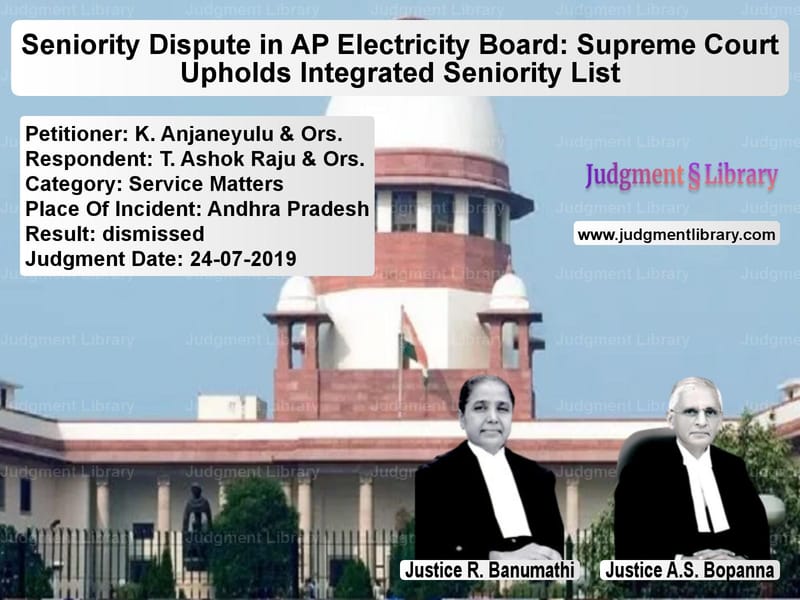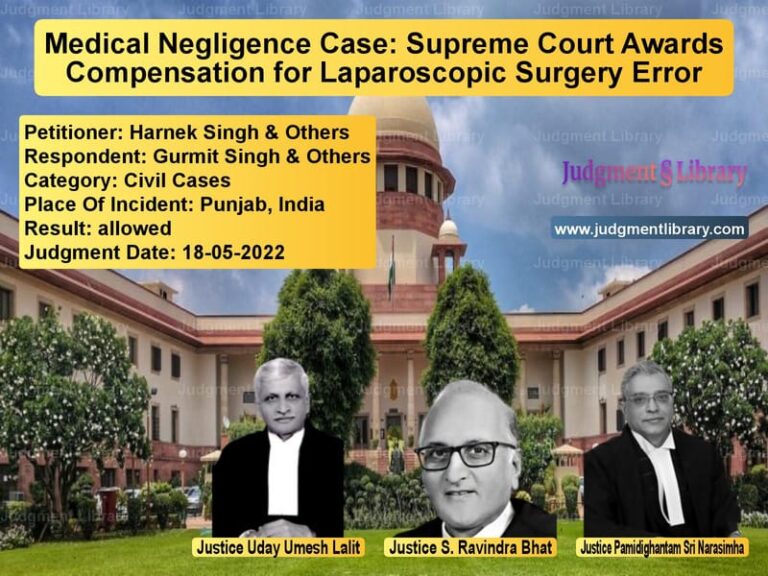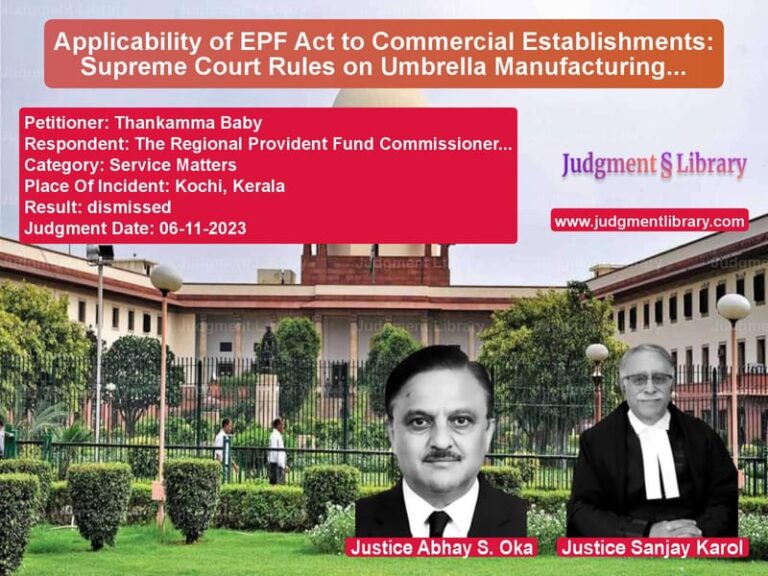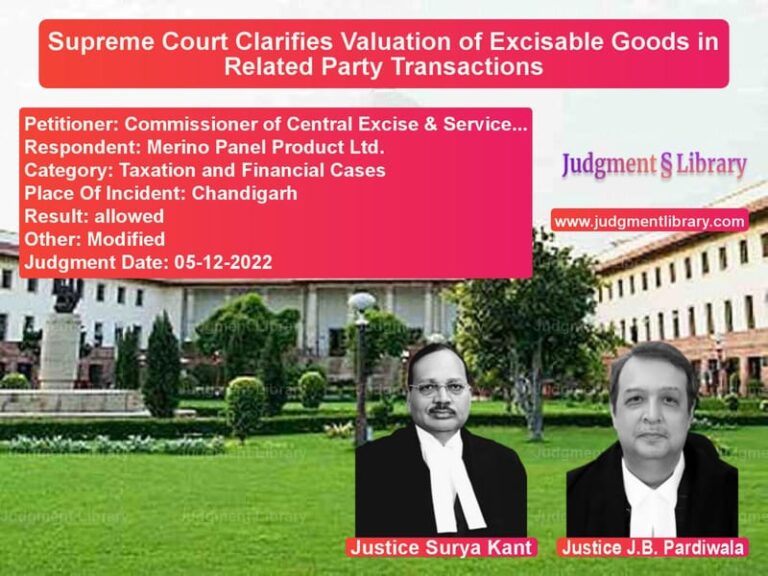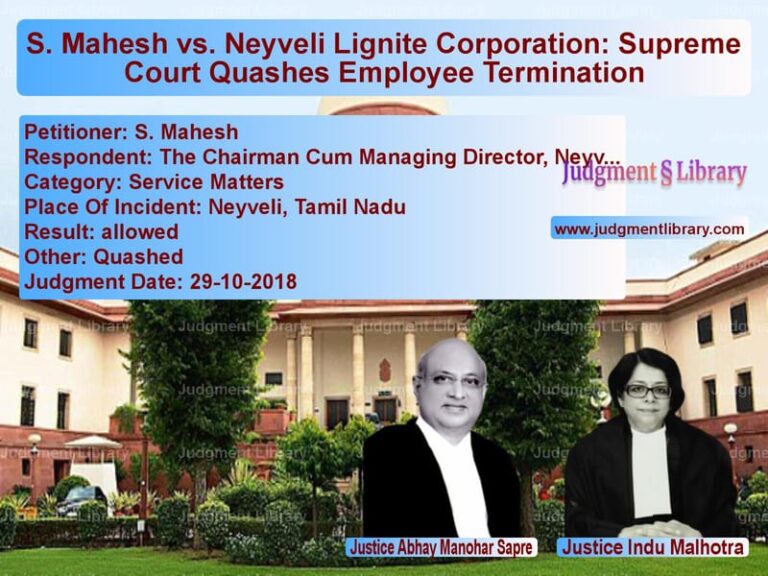Seniority Dispute in AP Electricity Board: Supreme Court Upholds Integrated Seniority List
The case of K. Anjaneyulu & Ors. v. T. Ashok Raju & Ors. revolves around the dispute over the inter se seniority of Lower Division Clerks (LDCs) and Typists in the Andhra Pradesh State Electricity Board (APSEB). The Supreme Court upheld the Division Bench judgment, ruling that the integrated seniority list prepared by the Board was valid and did not violate statutory regulations.
Background of the Case
The appellants, including K. Anjaneyulu, were employees of APSEB. Their grievance arose when they were superseded in promotions by employees who were earlier appointed as LDCs. The controversy centered around the issue of whether the training period of LDCs should be counted toward seniority for promotion to Upper Division Clerk (UDC) positions.
Key Facts
- Respondents No.1 to 10 and 14 to 21 were appointed as LDCs in February 1991.
- They underwent a three-month training period before being put on probation.
- APSEB issued a Memo on July 16, 2002, stating that the training period of LDCs/RCs should be counted as service for the purpose of promotion.
- The Memo relied on an earlier order issued on April 2, 1994, which clarified that LDCs, RCs, and Typists would be considered in an integrated feeder category for UDC promotions.
- The appellants, who were Typists, challenged the Memo, arguing that it violated the statutory Regulation 26 of the APSEB Service Regulations.
- The appellants filed a writ petition before the Andhra Pradesh High Court, seeking the quashing of the Memo and a revision of the integrated seniority list.
- The Single Judge ruled in favor of the appellants, declaring the Memo illegal.
- The respondents appealed to the Division Bench, which overturned the Single Judge’s ruling.
- The appellants then moved the Supreme Court.
Arguments of the Parties
Petitioner’s (K. Anjaneyulu & Ors.) Argument
- The training period should not be counted as service for seniority calculations.
- Regulation 26 explicitly defines how seniority should be determined, and the Memo contradicts this regulation.
- The integrated seniority list unfairly benefitted LDCs, giving them an advantage over Typists in promotions.
- The Single Judge correctly ruled that executive instructions cannot override statutory regulations.
Respondent’s (T. Ashok Raju & Ors.) Argument
- The training period was essential and functionally equivalent to service, justifying its inclusion in seniority calculations.
- The integrated seniority list was consistent with the Board’s earlier policies and administrative decisions.
- The Memo of 1994 was issued by APSEB in its statutory capacity and was binding on all employees.
- There was no regulation specifically prohibiting the inclusion of the training period in seniority computations.
Supreme Court’s Analysis
Applicability of Regulation 26
The Court examined whether the seniority determination violated Regulation 26 of the APSEB Service Regulations. It ruled:
“Regulation 26 does not deal with inter se seniority. The Board has statutory power to determine seniority based on rational administrative decisions.”
Validity of the Integrated Seniority List
The Court upheld the Division Bench’s view that the seniority list was legally valid. It noted:
“The appointing authority has the discretion to determine integrated seniority based on the date of joining and training period without contravening statutory provisions.”
Significance of the 1994 Memo
The Court ruled that the 1994 Memo was issued under the authority of the Board and was binding:
“The Memo dated April 2, 1994, was a valid exercise of administrative discretion, and its clarification in 2002 was merely a continuation of the same policy.”
Dismissal of the Appellants’ Claims
The Court rejected the argument that the integrated seniority list was arbitrary.
“We do not find any ground to interfere with the impugned order(s). The appeals are accordingly dismissed.”
Final Judgment
The Supreme Court ruled in favor of the respondents and upheld the validity of the integrated seniority list.
“The integrated seniority list prepared by the Board is legally sustainable and does not violate Regulation 26.”
The appeal was dismissed, affirming the Division Bench’s ruling.
Significance of the Judgment
- Clarifies Seniority Computation: The ruling establishes that training periods can be counted as service for promotion purposes.
- Upholds Administrative Discretion: It affirms that statutory bodies have the authority to determine seniority through administrative policies.
- Limits Judicial Intervention: The judgment discourages excessive judicial interference in matters of service regulations.
- Ensures Fair Promotion Policies: It provides clarity on how integrated seniority should be determined within feeder categories.
Conclusion
The Supreme Court’s judgment in K. Anjaneyulu v. T. Ashok Raju upholds the legitimacy of the integrated seniority list in APSEB. The decision ensures that training periods are recognized as valid service and affirms the Board’s authority in determining seniority. This ruling is a crucial precedent for public sector employment and administrative law.
Petitioner Name: K. Anjaneyulu & Ors..Respondent Name: T. Ashok Raju & Ors..Judgment By: Justice R. Banumathi, Justice A.S. Bopanna.Place Of Incident: Andhra Pradesh.Judgment Date: 24-07-2019.
Don’t miss out on the full details! Download the complete judgment in PDF format below and gain valuable insights instantly!
Download Judgment: K. Anjaneyulu & Ors. vs T. Ashok Raju & Ors. Supreme Court of India Judgment Dated 24-07-2019.pdf
Direct Downlaod Judgment: Direct downlaod this Judgment
See all petitions in Employment Disputes
See all petitions in Promotion Cases
See all petitions in Public Sector Employees
See all petitions in Judgment by R. Banumathi
See all petitions in Judgment by A. S. Bopanna
See all petitions in dismissed
See all petitions in supreme court of India judgments July 2019
See all petitions in 2019 judgments
See all posts in Service Matters Category
See all allowed petitions in Service Matters Category
See all Dismissed petitions in Service Matters Category
See all partially allowed petitions in Service Matters Category

